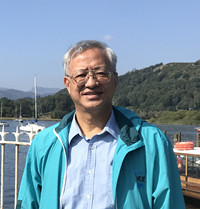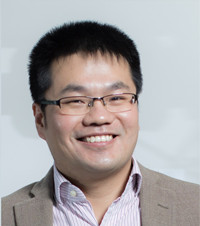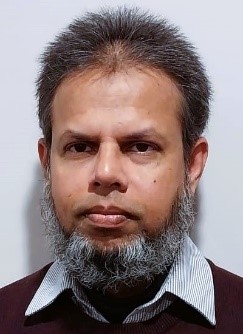
Prof. Steven Y. Liang (Fellow of ASME & SME)
Morris M. Bryan, Jr. Professor for Advanced Manufacturing Systems
Georgia Institute of Technology, USA
Steven Y. Liang holds a 1987 Ph.D. in Mechanical Engineering from University of California at Berkeley, USA, and was founding Director of Precision Machining Research Consortium and Director of Manufacturing Education Program and has been Morris M. Bryan, Jr. Professor for Advanced Manufacturing Systems at Georgia Institute of Technology, USA. Dr. Liang served as President of Walsin Lihwa Corp., a publicly-traded manufacturing entity with over USD6 billions of yearly revenue. Dr. Liang's technical interests lie in advanced manufacturing, precision engineering, and materials-centric production, and in these areas he has supervised over 90 post-doctoral studies, Ph.D. dissertations, and M.S. theses and has authored in excess of 450 book chapters, archival journal papers, and professional conference articles. He has delivered more than 60 keynotes and invited seminars at industries, peer institutions, and conferences in over 20 countries on manufacturing science and technology. Dr. Liang served as President of North American Manufacturing Research Institution and Chair of Manufacturing Engineering Division of The American Society of Mechanical Engineers. He is Editor-in-Chief of Journal of Manufacturing and Materials Processing (MDPI) and Editor of International Journal of Precision Engineering and Manufacturing (Springer). Dr. Liang is the recipient of Robert B. Douglas Outstanding Young Manufacturing Engineer Award of SME, Ralph R. Teetor Education Award of SAE, Blackall Machine Tool and Gage Award of ASME, Milton C. Shaw Manufacturing Research Medal of ASME, etc. Dr. Liang is a fellow of both ASME and SME.

Prof. Han-Yong Jeon
Inha University, South Korea
Professor Emeritus Han-Yong Jeon is a geosynthetics/technical organic materials researcher of Inha University, Incheon, South Korea. Since 1998, he is the director of Geosynthetics Institute Korea Directory and has worked in International Geosynthetics Society as Council member (2006~2012) and the 6th president of Korean Geosynthetics Society (2011~2013) and the 32nd President of Korean Fiber Society (2014~2015). He has published more than 1,101 proceedings in the domestic and international conferences and published 225 papers including “A Study on the Radiation Shielding and Absorption Effects of Nonwoven Composites by Monte-Carlo Simulation Analysis”, applied sciences, 12, 3570, 2022 in domestic & international journals. He wrote 25 Korean and English books including 'Review of Sustainable Geosynthetics Development Trend with Environmental Adaptive and Eco-Environmental Performances Point of View’, ISBN 978-1-78985-176-2, IntechOpen, 2020. He has awards of Marquis Who'sWho - Science and Engineering in 2003~2017 and Top 100 Scientists in the World: 2005/2011 of IBC (International Biographical Centre, UK). Also, he got the 33rd Academy Award of Korean Fiber Society in 2006 and “Excellent Paper Award of 2012” by The Korean Federation of Science and Technology Societies. Besides this, he got the 33rd Academy Award (The Korean Fiber Society), 2006 and the Best Publication Award (Korea Association of Technical Textile Industry), 2017 and the 41st Prize of Jung-Hun Textile Industry (Academy Award), 2020.

Prof. Stefan Dimov (FIMechE)
Head of Advanced Manufacturing Technology Centre
University of Birmingham, UK
Stefan Dimov obtained his Diploma Engineer and
Doctoral degrees in 1984 and 1989 respectively from Moscow State University of
Technology and the Doctor of Science degree in 2011 from Cardiff University.
In 1994, Stefan started his professional career at Cardiff University (CU) as a
Research Associate working on an EC funded research project. In 2001, a Micro
and Nano Manufacturing R&D programme in Cardiff was initiated by him with a
focus on advanced manufacturing research for miniaturised products and systems.
In 2004, Stefan became a Co-Director of the CU Innovative Manufacturing Research
Centre (CUIMRC) that was created with an award of a £3.25M grant from EPSRC’s
Innovative Manufacturing Programme.
After moving to Birmingham in September 2011 he was appointed the Head of the
Advanced Manufacturing Technology Centre (AMTC) at the School of Mechanical
Engineering in 2012. Since his promotion to Personal Chair in Cardiff in 2006
and currently as Chair in Micro Manufacturing in Birmingham he has carried out
research in Advanced Manufacturing, with a special focus on advances in Laser
Micro Processing, Micro and Nano Manufacturing, Additive Manufacturing and
Hybrid Manufacturing technologies. In his academic career Stefan has so far
published over 300 technical papers and co-authored 13 books. He has supervised
32 PhD candidates to successful completion and has been Principal and
Co-investigator of more than 70 projects with a total value in excess of £42M
funded by EPSRC, ESRC, Royal Academy of Engineering, DTI, TSB, WAG, EU, Innovate
UK and KTP.
Stefan is an active researcher with core expertise in characterisation,
modelling and development of advanced manufacturing technologies, maintaining a
significant output of papers in journals of international standing while also
having a proven track record for initiating and managing research projects
involving strong end user participation (more than 180 such organisations
to-date).

Prof. Rong Liu
Carleton University, Canada
Dr. Rong Liu is Full Professor of the Department of Mechanical and Aerospace Engineering, Carleton University, Canada. She has established research programs in development and performance characterization as well as manufacturing of superalloys and their composites, in collaboration with Kennametal Stellite Inc.―the industry leader specialized in producing high-temperature wear/corrosion-resistant superalloys and coatings, and with the Institute for Aerospace Research, National Research Council Canada (NRC), since 2000. She has published more than 150 articles in journals and conference proceedings. She is Member of the American Society for Metals (ASM), USA, and Member of the Professional Engineers of Ontario (PEO), Canada.

Prof. William C. Tang
University of California, USA
William C. Tang received his BS (1980), MS (1982), and PhD (1990) degrees in Electrical Engineering and Computer Sciences from the University of California at Berkeley. His seminal thesis and invention of the electrostatic comb drive has been internationally recognized as one of the key building blocks of Micro-electromechanical Systems (MEMS) sensors and actuators, and is the most widely-cited work in the field for over two decades. Since his graduation, Dr. Tang contributed to the automotive industry at Ford Motor Company and space exploration at the Jet Propulsion Laboratory. Subsequently, he served as the DARPA Program Manager for various MEMS programs, the single largest federal funding source for MEMS at the time. In 2002, he was appointed a Professor of Biomedical Engineering and Electrical Engineering & Computer Science at the University of California, Irvine. Later, he was also jointly appointed with the Chemical and Biomolecular Engineering and the Materials Science and Engineering Departments. He was the first Associate Dean for Research in the Henry Samueli School of Engineering from 2008 to 2013. His research interests include micro- and nano-scale biomedical engineering, neural engineering, neuropathology and clinical applications. He is a Senior Member of the Institute of Electrical and Electronics Engineers, a Fellow and Chartered Physicist with the Institute of Physics, and a Fellow of the American Institute for Medical and Biological Engineering.

Prof. Masayoshi Tonouchi
Osaka University, Japan
Masayoshi Tonouchi received the B.S. and M.S. and Dr. E. degrees form Osaka University, Japan, in 1983, 1985 and 1988, respectively. From 1988 to 1989 he worked at the Faculty of Engineering Science of the same university. From 1989 to 1994 he joined the Faculty of Computer Science and System Engineering, Kyushu Institute of Technology, Japan. In 1994, he moved to Kansai Advanced Research Center, Communications Research Laboratory, Japan. From 1996 to 2000, he was an associate professor at the Research Center for Superconducting Materials and Electronics, Osaka University. Currently he is a professor in Institute of Laser Engineering, Osaka University and a concurrent professor of Nanjing University. His current research interests include ultrafast optical and terahertz science of strongly correlated electron systems and nanomaterials, and development-and-applications of terahertz systems such as the laser terahertz emission microscope, compact THz time-domain spectroscopy systems, and others. He is a member of the Optical Society of America, Materials Research Society, the Japan Society of Applied Physics, the Physical Society of Japan, and the Institute of Electronics, Information and Communication Engineers. He is an associate editor for Journal of Applied Physics, AIP since Jan.1st, 2015. He chaired many international conferences such as OTST 2013.

Prof. Takashige Omatsu
Fellow of Japan Society of Applied Physics
Fellow of Optical Society of America
Fellow of SPIE
Chiba University, Japan
Takashige Omatsu (B.S. (1983), Ph.D. (1992) from
the University of Tokyo) is a professor of nano-science division of a faculty of
engineering in Chiba University.His research intersts cover a variety of areas,
such as nonlinear optics, solid-state and fiber lasers, singular optics, and
super-resolution spectroscopy. Recent work has focused on chiral control of nano-structures
by angular momentum of light. Such chiral nano-structures will potentially
provide a new scientific aspect to metamaterials, plasmonics, and silicon
photonics, and they might also enable us to develop nanoscale imaging systems
with chiral selectivity.
He has already published >100 refereed journal articles, and he has performed
>20 invited presentations of major international conferences, including CLEO,
CLEO Pacific-Rim, CLEO Europe, LEOS, and ICALEO meetings. He has been appointed
as an Associate Editor of Optics Express during 2006-2012.
He is also on the editorial board of Applied Physics Express.
He is currently working as a steering committee member of the conference on the
laser and optoelectronics pacific-rim (CLEO Pacific-rim).
Professor Omatsu is Fellow of the Japan Society of Applied Physics, Fellow of the Optical Society of America, and Fellow of SPIE. He is also Visiting Professor,
Xinjiang Normal University, China.

Shyh-Chour Huang (Fellow of IET)
National Kaohsiung University of Science and Technology, Taiwan
Shyh-Chour Huang holds a 1990 Ph.D. in Mechanical Engineering from University of Cincinnati, USA. He is a distinguished professor with the Mechanical Engineering at the National Kaohsiung University of Science and Technology, Taiwan. Dr. Huang is a Fellow of IET and Senior Member of IEEE. His research interests include biomechanics, compliant mechanisms, metamaterials, multibody dynamics, vibration control, and optimization design. Up to now he has published as author and co-author excess of 400 scientific and professional papers in journals and conference proceedings. He was a visiting scholar at Department of Mechanical Engineering, University of California, Berkeley, USA, visiting professor at Faculty of Mechanical Engineering, Ho Chi Minh City University of Technology and Education, Vietnam and joint professor of Ton Duc Thang University, Vietnam.

Bo Li
Kennesaw State University, USA
Dr. Bo Li is currently an assistant professor in the Department of Mechanical Engineering, Kennesaw State University. Dr. Li’s research aims to develop self-assembled electronically active biomaterials for artificial intelligence and next generation electronics. There are two fundamental challenges in the field: 1. understanding the charge transport in the self-assembled systems; 2. controlling the self-assembly under non-equilibrium conditions. His research directly addresses the fundamental scientific issues in these systems by leveraging a unique set of skills in innovative materials synthesis and characterization. He received his PhD in Materials Science and Engineering from Georgia Institute of Technology in 2015, focusing on fluid confined self-assembly of functional nanomaterials. Later at University of Illinois at Urbana-Champaign as a postdoc, he studied the charge transport mechanisms at single molecule level using customized scanning tunneling microscopy. To date, he has published 40 peer-reviewed papers in journals including Angew. Chem., ACS Nano, JACS, Chem. Sci., Nature Comm., ACS Appl. Mater. Interfaces.

Prof. Da-Jeng Yao, National Tsing Hua University, Taiwan
ASME Fellow, RSC Fellow
Editorial advisory board member for Biomicrofluidics
Associate Editor Board member for IET NanoBiotechnology
Dr. Yao is a Professor at Department of Power
Mechanical Engineering, also an adjunct Professor at Institute of
NanoEngineering and MicroSystems (NEMS), Department of Engineering and System
Science, and Department of Physical Education, National Tsing Hua University,
Taiwan. He was born at Taipei, Taiwan in 1969. He received his Ph.D. from
Department of Mechanical and Aerospace Engineering, University of California at
Los Angeles (UCLA) in 2001.
There are more than 80 multidisciplinary projects running or completed under his
research team with other organizations (NTHU LS, CHEM, EE, PME, NEMS, and ESS,
NTU ME, NCTU ME, Chang-Gung Hospital, and ITRI, etc.). More than 80 journal
papers were published at top journal among this research field, including
Biosensors and Bioelectronics, Biomicrofludics, Nanotechnology, Applied Energy,
Journal of Micromechanics and Microengineering, and Lap on a chip, etc. He got
Wu-Da-Yu Memorial Award (Young Investigator) from National Science Council in
2009, Shen-Yin award in 2010, and Young Researcher from Society of Theoretical
and Applied Mechanics of the Republic of China in 2011, National Innovation
Award in 2012 and in 2014, Nanoscience Award by Publishing Division of Cognizure
in 2015, 2nd prize of Xprize (US10M award) by Qualcomm with HTC team in 2017,
and MOST excellent research award in 2020. He was awarded as ASME fellow since
2013, and RSC fellow since 2018.

Lunyong Zhang
Harbin Institute of Technology, China
Dr. Lunyong Zhang, is currently an associate
professor of Harbin Institute of Technology (HIT, China) with general research
interests in the field of atomic scale growth and properties modulation of
quantum materials and precisely solidification formation of advanced alloys. Dr.
Zhang received his PhD, MS and BS from HIT. Before joining HIT in May 2020, he
was an associated researcher at the MaxPlanck-POSTECH center for complex phase
materials of Pohang University of Science and Technology, Korea and a visit
scientist of the MaxPlanck Institute for Chemical Physics of Solids,
Germany. He has reported a series of emergent results about the iridates and
other novel compounds, for example the first electronic transport evidence of
the semimetal state of SrIrO3 and the strong temperature sensitivity of
spin-orbit interaction in iridates, the topological magnetoresistance of chiral
spin texture like skyrmionics bubbles. He also revealed the nature of multiple
scale bifilm defects in the advanced complex castings of magnesium, aluminum,
copper and other alloys, discovered the nonequilibrium reaction feature of such
kind of emergent casting defects. Dr. Zhang is a Fellow of International
Association of Advanced Materials (IAAM) , was rewarded the IAAM Scientist award
(2023) and the advanced materials award (2024) . He has contributed 70+
publications on journals including Physical Review Letters, Nature
Communications, Advance Functional Materials, Nano Letters, Critical Reviews in
Solid State and Materials Sciences、Physical Review B, ACS Applied Materials &
Interfaces, Scripta materialia and is an expert reviewer of Italian Ministry of
education, universities and Research (MIUR) and invited referee of journals such
as Applied Physics Review, Materials Science & Engineering A, etc. He also is a
young editor of the international journal “The Innovation” and “Advanced Powder
Materials” and guest editor of journals “symmetry” and “Frontier in Materials”
The cookie settings on this website are set to "allow cookies" to give you the best browsing experience possible. If you continue to use this website without changing your cookie settings or you click "Accept" below then you are consenting to this.




